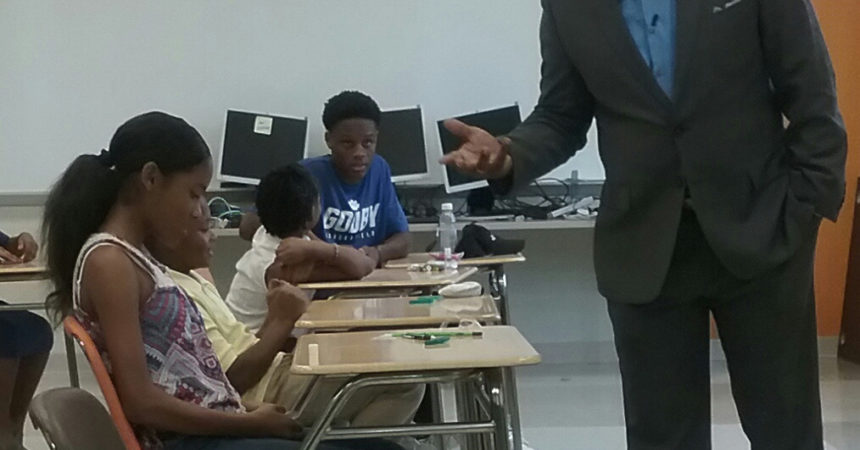
Southside symposium focuses on education disparities

Pastor Rudy Ferguson explains to a group of young people how to set goals and stay motivated while pushing for success.
Photo by St. Clair Murraine
By St. Clair Murraine
Outlook staff writer
A cross-section of Southside residents spent more than six hours discussing disparities in education and healthcare resources as well as ways to help children develop a sense of hope about their future.
At the end of the Southside Neighborhood and Community Engagement Symposium, facilitators were optimistic that those who attended will become surrogates to take the message into their neighborhoods.
Education was clearly the hot-button topic this past Saturday at FAMU DRS. The panelists spent most of the day’s last session focusing on why children who attend Title I schools struggle in the classroom. Non-title I schools generally report higher grades, creating a gap between Southside schools and those in other areas.
Leon County’s 13 Title I schools are designated for students from low-income families.
Christic Henry, director of Capital Area Neighborhood Network who organized the symposium, said school officials should go into the Southside neighborhoods to hear the challenges faced by parents of children in Title I schools.
“If outcomes are significantly different over here (on the Southside) than they are in other places, then there needs to be a recognition of why that is,” Henry said. “We need to learn how the system works so we can understand why the outputs are what they are over here. We hear the same thing; parental involvement and apathy, but the system is more complex than that.”
During the discussion, parents’ frustration was obvious over the difference in Title I and non-Title I schools.
“There needs to be more integration of community and school,” Henry said. “There needs to be strategic integration.”
Earlier in the day, Brandi Knight, manager of community health and planning for Leon County, gave a group of about 10 people a breakdown of a health assessment. The 2016 survey targeted neighborhoods like South City, Bond, Frenchtown, Fairbanks Ferry Road and Highway 20.
The assessment found that diabetes and heart disease are the two leading health issues in the areas surveyed, Knight said. Some of the health challenges that Southside residents face are the result of socioeconomic factors like the quality of housing and lack of lighting and sidewalks, she said.
“If I can’t go outside; you’re gaining weight so now you have obesity,” she said. “If you can’t afford to go to the gym, you’re stuck inside.”
Knight said the 55-page assessment that she handed out is loaded with resources that could help curb some of the health issues.
“I’m hoping that my phone will ring with people saying we would like you to come out to talk more in detail; what it means and how can we use it,” she said.
Knight reminded her audience that eating healthy foods could help reduce most ailments. Monet Moore has seen proof of that. She works with a community garden in the Providence neighborhood off Lake Bradford.
“We want to provide a sustainable source of food for our community,” she said. “We also have (military) veterans in the Providence neighborhood. We know that some of them suffer with TPSD and (gardening) helps to provide a coping mechanism.
“Instead of just providing a hobby, it will provide a healthy form of interest for our community. Everyone in this room should consider themselves vessels so they can take this to their neighbors and communities.”
One of the other highlights of the symposium was a session led by pastor Rudy Ferguson. He challenged his audience of young people to hold fast to their dreams.
Ferguson made his point by sharing his own story of being expelled from school and how his younger brother inspired him to change his life. He beseeched them to be particular about choosing their friends.
“Before you start making friends, ask them what their dreams are,” he said. “The moment they tell you they don’t know that means you have to reevaluate how it’s going to work out.
“You’ve got to surround yourself with friends with a mindset of going somewhere.”







